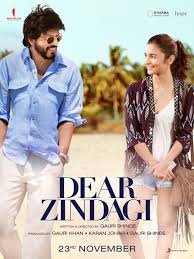Life isn’t always easy, and sometimes you need a little help finding your way, which is where this film shines. Starring Alia Bhatt and Shah Rukh Khan, Dear Zindagi is set in modern-day Mumbai and Goa, capturing the beauty of these locations while exploring the complexities of urban life. Directed by Gauri Shinde, the film falls into the genre of a coming-of-age drama, tackling mental health and personal growth with a refreshing touch of realism. The film’s contemporary setting and relatable themes give it an air of authenticity, making it a standout in its genre.
At the heart of the story is Kaira, a talented cinematographer played by Alia, who struggles with the challenges of her career and personal relationships. After a series of failed relationships and mounting frustrations at work, Kaira finds herself in a downward spiral of anxiety and emotional turmoil. This is when Dr. Jehangir Khan, affectionately called Jug, enters her life. Played by Shah Rukh, Jug is a therapist who helps Kaira confront her fears, unresolved issues from her past, and her relationship with herself. The narrative beautifully explores their journey as Kaira learns to deal with her emotional baggage, leading to a deeper understanding of life and relationships without giving away too much of how their dynamic evolves.
One of the strongest aspects of the film is the acting. Alia delivers one of her career-best performances, portraying Kaira’s vulnerability, frustration, and eventual self-realization with a remarkable sense of authenticity. Whether it’s her quiet moments of introspection or her emotional breakdowns, she brings depth and relatability to Kaira. Shah Rukh as Jug is calm, wise, and exudes a comforting presence. His portrayal of the unconventional therapist is both warm and understated, steering clear of being preachy. The chemistry between Alia and Shah Rukh is effortless, despite their relationship not being romantic. Their interactions are tender, humorous, and thought-provoking, making every scene between them a joy to watch.
Gauri’s direction is subtle yet impactful, with a focus on character development and emotional depth rather than melodrama. The film’s pacing may feel slow to some, but it mirrors Kaira’s journey of self-reflection and healing. Gauri allows the audience to sit with Kaira’s discomfort, making her internal struggles palpable. The use of minimalistic dialogue and silences speaks volumes, and one particular scene where Kaira finally opens up to Jug is handled with great sensitivity. Gauri also deserves credit for how she normalizes therapy and mental health discussions in a society that still largely stigmatizes these issues.
The cinematography by Laxman Utekar deserves a special mention. Goa is shot in a way that feels serene and reflective, matching the film’s tone of inner peace and clarity. The visuals of beaches, winding roads, and sun-kissed afternoons enhance the overall mood, providing a sense of calm amidst the emotional turbulence Kaira is experiencing. The way the camera captures Alia’s expressions in close-up shots also adds to the intimacy of her emotional journey. The framing often places her in isolation, visually representing her internal loneliness and confusion.
The music by Amit Trivedi complements the film beautifully. With a mix of soulful tracks like “Love You Zindagi” and the haunting “Just Go To Hell Dil,” the soundtrack encapsulates Kaira’s emotional highs and lows. The music doesn’t overpower the narrative but instead acts as a perfect accompaniment to the various phases of Kaira’s journey. The background score is subtle and never intrusive, allowing the dialogues and performances to take center stage.
Costume design and production design are worth noting as well. Kaira’s wardrobe reflects her free-spirited yet conflicted nature. The casual, breezy outfits are in sync with her personality and the film’s overall vibe, while the production design—especially Jug’s therapy room—creates a warm, safe space, contributing to the comfort and ease Kaira gradually feels. The attention to detail in these aspects makes the world of the film feel grounded and relatable.
While the film excels in many areas, it does have its limitations. The second half feels slightly dragged, especially with Kaira’s interactions outside of therapy sessions. The supporting characters, such as Kaira’s friends and family, while likable, don’t add much depth to the story, and their arcs could have been explored further to create a more well-rounded narrative. The focus on Kaira and Jug is so central that other aspects of her life feel somewhat sidelined.
Overall, Dear Zindagi is a refreshing take on self-discovery, mental health, and emotional healing. It’s a film that resonates deeply with anyone who has ever felt lost or overwhelmed by the pressures of life. Alia’s compelling performance combined with Shah Rukh’s calm wisdom creates a dynamic that is both engaging and thought-provoking. While the film’s slow pace might not be for everyone, those who appreciate character-driven narratives will find it rewarding. Its message about embracing imperfections and seeking help when needed is both timely and important, especially in today’s fast-paced world. If you’re looking for a film that encourages introspection and offers a gentle reminder to love yourself, this is one to add to your list.







